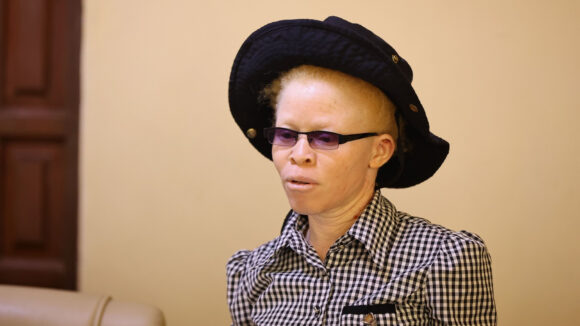
Lucy Odwar
Director of social services, Homabay County government, Kenya
Lucy’s story
“I was appointed as the County’s Disability Director last year. I am a teacher by profession but have been involved in the County Disability Forum for a long time – advocating and fighting for the rights of people with disabilities. Before the sitting county governor was appointed, I used to go to her office and challenge her on how the government was supporting people with disabilities, so it was through those activities that the county saw potential in me.
“My responsibility as the director in charge of disability inclusion is to link the county government with people with disabilities at the grassroots. I also advise the governor on what people with disabilities expect from the sitting government and work on developing policies to support the implementation of the County Disability Act. It is for me to fight, advocate for and influence the duty bearers to ensure that rights holders are not left behind.
“Another important area of my work involves data – the county government needs to know how many people with disabilities there are in the county, the qualifications they have, or the number of children with disabilities enrolled in schools.”
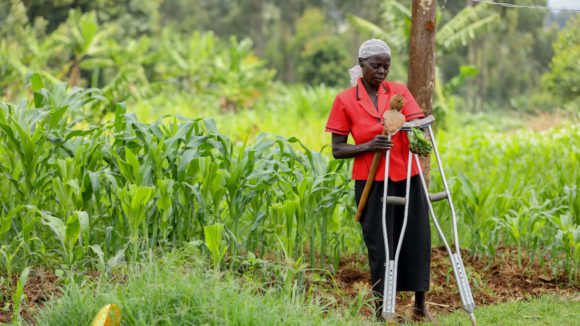
Global Labor Program – Inclusive Futures
This programme is working to address barriers which prevent women with disabilities from participating in the supply chain of large-scale agricultural and retail businesses in Kenya.
About the programmeLimited roles and routes for women
“Because of stigma, some men fear marrying women with disabilities. Many people don’t want to engage with you, for example in business or social life. As a woman with a disability, there are specific routes that I am expected to take. I am not expected to do courses like engineering or mathematics. I am expected to teach or do nursing.
“In our community in western rural Kenya, there are many myths and misconceptions about women. There are specific types of crops that women are not supposed to plant or grow. Then if you are a woman with a disability, people don’t even expect you to farm so you must train yourself through observing others. When a woman goes to the shop to buy sorghum seeds, the first question she’ll get is: “don’t you know that women should not be planting sorghum without their husbands?”
“Women are not entitled to own land. They only get access to land once their husband has passed away. But if a woman isn’t educated, they can lose the right to own that land. It will go back to the community. Women with disabilities are often seen as a curse.”
Benefits of the Global Labor Program
“Homabay County Disability Forum (HCDF) is the umbrella organisation representing people with disabilities in the county. As part of the Global Labor Program – Inclusive Futures, HCDF mobilises farmers with disabilities to enroll in the programme. We explain the benefits they will gain, like being enrolled in the farmer hubs, and gaining access to advice, training, markets for their produce, and collective bargaining power.
“Since the programme started, there’s been a great change. Women with disabilities are engaging in the programme. Members of society are starting see the person first before their disability, they see you and what you have done instead.
“Through my involvement in the Global Labor Program and working with organisations of people with disabilities, like HCDF and United Disabled Persons of Kenya, I have strengthened my own understanding of disability inclusion. Previously, there were types of disabilities I didn’t know or understand – especially those which aren’t visible. Through our advocacy work, I’ve increased my understanding of what it is to be inclusive and how you can ensure that programmes don’t only include people with certain disabilities.
“The Homabay County Disability Act was assented to by the previous government in 2020. However, there are challenges with its implementation. The government cannot allocate appropriate funds, because we don’t have a database with an accurate number of people with disabilities living in the county. We also need to develop policies to support the implementation of the Disability Act. We are still trying to implement certain sections, like ensuring proper accessibility and ensuring that people with disabilities are employed in different departments – according to the commitment of having at least five percent of people with disabilities employed in government departments.
“In my role as disability inclusion director, the first thing I would like to achieve is having a database of everyone with a disability in the county. I would also like to map all the organisations that work with people with disabilities at a grassroots leveI. It’s my aim to support the local government to mainstream disability in every department, so people with disabilities are informed and engaged in everything that is going on at a county level.”
No longer an isolated group
“My hope is that there will be lots of women with disabilities in positions of power, not just one or two. As women with disabilities, we must stand up and fight for our right to decent work. We also need to advocate for our rights alongside women without disabilities. Let’s go out for whatever we want.
“We should not think of people with disabilities as an isolated group. When we are celebrating women or young people, we should make it our collective responsibility to celebrate everyone – including women and young people with disabilities.”
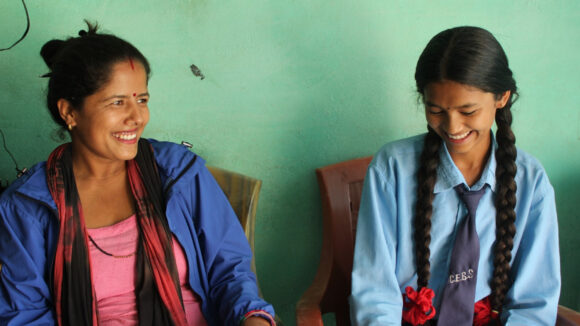
Reaching women and girls with disabilities
Learn more about how to include women and girls with disabilities in development and humanitarian programmes.
Access our resourcesInterested in delivering inclusive development?
Find out moreMore from our people
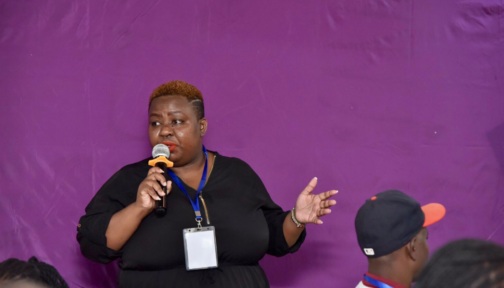
Esther Mkamori: “Women and girls with disabilities must be consulted and heard”
Esther Mkamori is head of programmes at United Disabled Persons of Kenya (UDPK), the national umbrella organisation of people with disabilities.
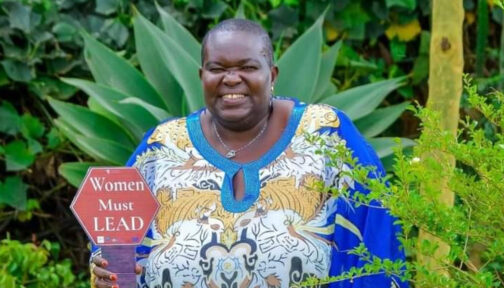
Lucy Mulombii: “We believe in nothing for us without us”
Lucy is the chair of a women-led organisation of people with disabilities and chair of Kakamega County Disability Caucus in rural Kenya. She has also received support as part of our inclusive livelihoods project in Kenya.
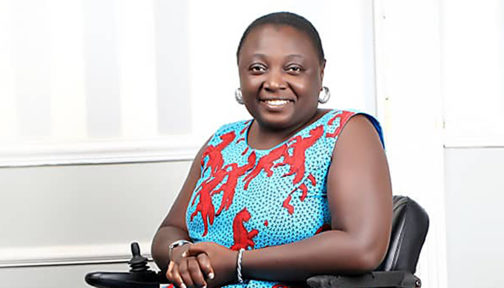
Lois Auta-Udonkanta: “I see my disability as a bridge and not as a barricade”
Lois is the CEO of the Network of Women with Disabilities in Nigeria. She raises awareness about the rights of women and girls with disabilities so they are included in national policies.